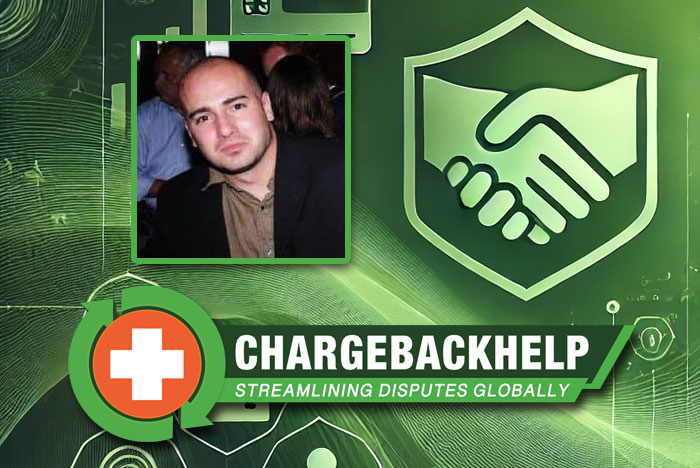Business Questions
Professional Journey
Could you share the path that led you to specialize in data security and chargeback mitigation?
I’ve never had what some would call a hard set plan, I’d call it more a series of well timed opportunities.
My time working in future technology analysis, gave me a baseline of understanding of data security theory. It also required me to constantly be online looking at ways people were adapting current technology. From all that time online I developed a side interest in online marketing. Well at the same time I was introduced to the practical side of data security. In the decade that followed the two would flip flop roles as my primary interest. Learning and understanding processing was a natural and needed skill progression.
What motivated you to join ChargebackHelp, and how has your role evolved since then?
Prior to COVID-19, ChargebackHelp was a client that I was provided consultancy services to.
As the company expanded, so did its need to service clients in the EU and develop the necessary infrastructure to support current operations and manage growth in the region. I had already been considering a move to the EU, so when the chance to join the team full-time and relocate came up, it just felt like the right move.
Industry Insights
What are the most significant challenges merchants face today regarding chargebacks and fraud prevention?
Merchants today encounter several major challenges in the realm of chargebacks and fraud prevention. One of the primary issues is chargeback abuse, often referred to as “friendly fraud.” This occurs when customers dispute legitimate charges without first contacting the merchant, which can stem from buyer’s remorse, a misunderstanding of the chargeback process, or intentional fraud.
Another challenge is return and refund fraud, where customers exploit lenient return policies by returning used or damaged items or falsely claiming non-delivery to receive refunds. The financial impact of chargebacks is also significant, as they not only result in lost revenue but also incur additional fees and increased processing costs. The process of disputing invalid chargebacks, known as representment, is both time-consuming and highly regulated.
Frequent chargebacks and fraud can damage a merchant’s reputation, leading to a loss of customer trust and potential business. Detecting fraud has become increasingly complex due to the growing sophistication of fraud techniques, necessitating advanced tools and strategies. Policy abuse, such as the misuse of promotional codes and fraudulent claims of non-delivery, further complicates the issue.
Additionally, merchants must deal with bad faith affiliates who may not act in the merchant’s best interest. Keeping up with changes to the rules set by card schemes can be challenging, and the timely and effective application of new tools and services designed to manage these issues can be an issue in itself.
How do you foresee the landscape of chargeback mitigation evolving in the next five years?
I think we will see some big changes in chargeback mitigation, thanks to tech advancements and changing consumer habits. For starters, AI and machine learning will get even better at spotting and stopping fraud in real-time by picking up on patterns and anomalies.
We’ll also see more use of advanced data analytics to understand customer behavior and transaction trends, which will help prevent chargebacks before they happen. Stronger authentication methods, like biometrics and multi-factor authentication, will make it tougher for fraudsters to succeed.
As regulations evolve, new rules will aim to protect both consumers and merchants, so staying compliant will be key. Collaboration and info-sharing among merchants, banks, and payment processors will be crucial for developing effective strategies against chargebacks and fraud.
We already have new tools like Verifi’s RDR, shifting the focus more towards fraud metrics. Verifi’s Order Insight product will play a big role too, by providing greater transparency to consumers about their transactions, which can help reduce friendly fraud. MasterCard’s Consumer Clarity product will also be important, as it gives cardholders detailed purchase info through their bank apps, reducing confusion and disputes.
VISA is set to release new mandates in April 2025, with a greater focus on fraud metrics. We can expect other card schemes to follow with their own mandates and rule changes. With all these changes, new services and tools will pop up to help merchants and their acquirers stay compliant. Overall, the future of chargeback mitigation will be shaped by tech advancements, regulatory changes, and a team effort among industry players.
Strategies and Solutions
Can you discuss some effective strategies for mitigating chargebacks and recovering lost revenues?
There are several effective strategies for mitigating chargebacks and recovering lost revenues. First, make sure your product descriptions, pricing, and return policies are clear and easy to find. This helps set the right expectations and reduces misunderstandings that can lead to chargebacks.
Providing excellent customer service is also crucial. Make it easy for customers to contact you with any issues and resolve disputes directly to prevent chargebacks. Sending order confirmations and tracking information keeps customers informed about their purchase and delivery status, reducing the likelihood of disputes. Using clear and recognizable billing descriptors on credit card statements helps customers identify their purchases and avoid confusion.
Services like Ethoca Alerts, Verifi’s RDR, and Order Insight provide real-time alerts about potential chargebacks and offer detailed transaction information to customers, which can help resolve disputes before they escalate. Developing a robust dispute resolution process to handle chargebacks efficiently, including gathering and submitting all necessary documentation to contest invalid chargebacks, is important. Verifi’s CE 3.0 solution can be a game-changer here. It uses qualified transaction data, like account ID, IP address, and device ID, to establish a clear link between the merchant and the cardholder, helping to block illegitimate disputes before they become chargebacks.
How does ChargebackHelp’s approach differ from other solutions in the market?
We provided end-to-end support, from preventing chargebacks to managing disputes and recovering lost revenue. This approach ensures that merchants have the tools and support they need at every stage of the chargeback process. We combine various dispute management technologies into a single, card-agnostic portal, which means merchants can handle disputes across all payment networks from one platform. This simplifies the process and reduces the administrative burden.
We emphasize a proactive approach to chargeback prevention. This includes using clear billing descriptors, sending out chargeback alerts, and taking other preemptive measures to prevent disputes before they escalate into chargebacks.
Technological Integration
What role does technology play in enhancing chargeback mitigation processes?
Technology is crucial for improving chargeback mitigation. It makes managing chargebacks more efficient by streamlining and automating a lot of the process. For example, having centralized notifications from payment processors and banks helps merchants respond to disputes quickly. When you integrate these systems with CRMs and order management tools, businesses get a full picture of customer data. Using technology in this way not only cuts down on chargebacks but also boosts efficiency, and protects revenue.
Are there any emerging technologies that you believe will revolutionize fraud prevention and dispute management?
Absolutely… There are several emerging technologies that are set to revolutionize fraud prevention and dispute management. One of the most promising is Artificial Intelligence (AI). These systems continuously learn and adapt to new fraud techniques, making them incredibly effective.
Biometric authentication is also gaining traction. By using unique biological traits like fingerprints, facial recognition, or even voice patterns, businesses will be able to add an extra layer of security to their transactions. Incorporating these technologies will significantly improve the efficiency and effectiveness of fraud prevention and dispute management.
Client Success
Could you share a success story where your expertise significantly impacted a client’s chargeback rates?
We just published a case study that we did with an Acquiring partner, we used a combination of Ethoca Alerts and Visa RDR. The Acquirer we able to show a prevention of more than 98,000 chargebacks.
That translates to 75% of total chargebacks, and 83% of all fraud-related chargebacks to their merchants and the payments ecosystem in general. In addition, since implementing these programs that promote positive refunding behavior and lower overall chargeback levels, they noticed 3% improvement in transaction acceptance.
What metrics do you consider when evaluating the effectiveness of a chargeback mitigation strategy?
I think some key areas to look at are monitoring the effective chargeback rate per merchant account and per card type. This helps in identifying specific areas where improvements can be made.
Another key area to look at is the overall increased transaction approval rates and approval rates per issuing BIN. Additionally, keeping an eye on total processing costs is crucial. Even for merchant with low chargeback rates, a further reducing it can lead to fewer declined transactions, more successful rebills, and lower overall processing fees.
Personal Questions
Background and Interests

I got interested in data security and e-commerce because of how quickly the digital world was growing and changing. With more businesses and people going online, I saw huge potential for cool innovations and convenience, but also a lot of new risks like cyber threats and fraud. The challenge of keeping information safe and making sure transactions are secure really fascinated me. Plus, this field is always evolving, which keeps things exciting and motivates me to stay ahead of the latest threats.
Are there any personal experiences that influenced your career path in this industry?
One experience that really influenced my career path was when a close friend’s online business was hit by a major cyber attack. Seeing the impact it had on their business and the stress it caused them made me realize how crucial data security is. It forced me to see just how vulnerable not just to attack, but to the paralyzing effects even a simple attack can have on a business when people don’t really know what the next step to take are. This experience fueled my passion for data security and e-commerce, and it motivated me to dive deeper into the field and make a difference. It’s also why I will generally not accept payment when someone asks for help well under well their proverbial house is on fire. A number of those people later became friends, clients, and or had some form of a hand in my long term career path.
Which is your favorite conference from a professional perspective?
TES Prague is my favorite conference, the size of the conference, the diversity in the people attending, and the event location all seem to work together and make it the positive event that it is.
If the internet had never been invented, what would you be doing for a living today?
If there was no internet almost everything I’ve done in the last 30 or so years would not have been possible. I would have likely followed in the family business and would be doing electrical contracting or some form of construction.
Work-Life Balance
How do you manage the demands of your role while maintaining personal well-being?
If I’m honest, I’m driven by work. Anyone that I have worked with or that knows me will tell you that
if I’m not working on something I will find something to work on. I’d say that my work life balance is defiantly more work than any assemblance of balance.
What activities or hobbies do you engage in outside of work to unwind?
If I’m not working or traveling, I’m likely playing an endless game of fetch with my dog, trying to automate some part of the house that doesn’t need automation, or wandering around Romania taking in the views.
Continuous Learning
How do you stay updated with the latest trends and developments in data security and fraud prevention?
For the processing side of things, there is a healthy amount of online events and workshops provided by MRC, VISA, and MasterCard.
On the data security side there are a few news sites I try to keep up with, Wildwest Hackin Fest and DEFCONConference do a good job with putting their events and speakers up on youtube. Reddit has a groups that are a fire hose of information. Depending how busy I am, I’ll take a class on Udemy. Right now I’m trying to dedicate some time to going deeper into AI.
Are there any books, courses, or resources you would recommend to professionals aspiring to enter this field?
I’m a big proponent of exploring data security courses on Udemy, there are a number of beginner courses. Data Security has many paths and layers. I’d also suggest learning Python and taking a few courses to learn Kali. From there someone should have a level fundamental understandings of what aspects of data security interest them the most, and aim for getting some certifications that are meaningful that will get them into the job market. Some of the more advanced certs and classes can get up there in price. Most data security books become outdated quickly.
With regard to processing, if I was just starting out I’d spend a little time getting to know the history of each of the card schemes, VISA and Mastercard have news rooms that will help someone get an understanding of the current space, services they offer and rules.
Mentorship and Advice
Have you had any mentors who significantly influenced your career? If so, how did they impact you?
My first real job was for a forward looking research company focused on data security and wireless. After about a year I went on my first real work vacation taking a trip out west to visit a college roommate over the summer. During my stay his roommate spent day and night working in the dining room on his PC. For the first couple days I just assumed he was playing videos games.. In reality, he was running pen tests for a number of companies. Seeing the gamified thrill of the practical side of data security, made me realize I wanted to make a shift in what I was doing.
At the time I was already doing some affiliate marketing, and getting offers to work for online companies. Within a year I was working for an SEO company during the day, studying at night for MCSE, and my weekends were spent digging deeper into email campaigns and online marketing.
What advice would you give to someone starting a career in chargeback mitigation and data security?
Starting a career in chargeback mitigation and or data security is an exciting journey! My advice would be to stay curious and keep learning, things are constantly evolving. It’s important to stay up-to-date with the latest trends, technologies, and best practices. Developing strong analytical skills is crucial, as being able to analyze data and identify patterns is key in both chargeback mitigation and data security.
Understanding the business side is also important. Knowing how businesses operate and what their pain points are can help you develop more effective strategies. Networking in the industry can provide valuable insights, support, and opportunities. Being proactive and detail-oriented can make a big difference, in both cases identifying potential threats early and paying attention to details is essential.
Gaining hands-on experience is invaluable. Look for and create opportunities, or entry-level positions that allow you to apply what you’ve learned in real-world scenarios. Every expert was once a beginner.
If you could give your younger self a piece of advice, what would it be?
Buy Bitcoin when its under $1 and hold to $100,000… I’d also say to not take so long to seek community, I spent a number of years early on thinking that I was too small to contribute or attend events. Looking back I think that forced me to learn to adapt and learn new skills, but also caused me to miss on valuable networking opportunities.
Future Aspirations
What are your personal and professional goals for the next few years?
My goal is to create tools that are both highly useful and easy to understand. One major issue with many tools and services on the market is their complexity. When tools are too complex, they face adoption challenges, and even when they are used, they often aren’t utilized to their full potential.
How do you envision your role in the industry evolving as new challenges and technologies emerge?
As new challenges and technologies emerge collaboration will be key. Working closely with other, sharing knowledge, and developing best practices will be essential to staying ahead of the curve. I also see myself playing a role in educating and mentoring my team, helping them navigate the complexities of this field.
Ultimately, my goal will be to continue making a positive impact by creating efficient, and user-friendly solutions that help businesses thrive in an ever-evolving digital landscape.
More information and contact details can be found here: https://chargebackhelp.com/
Thank you very much, Paul, for taking the time to do this interview with us. We can´t wait to see you again at TES Seville 2025.










